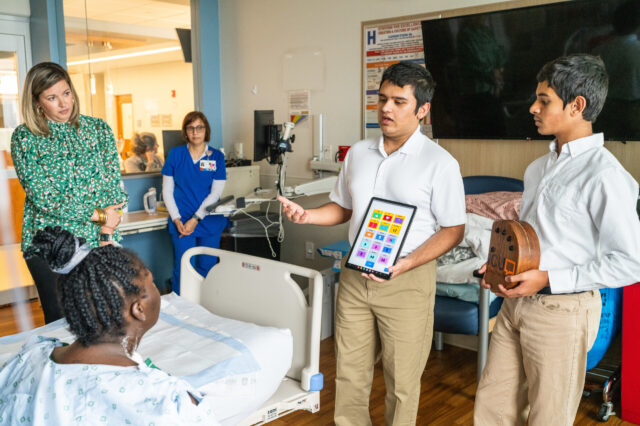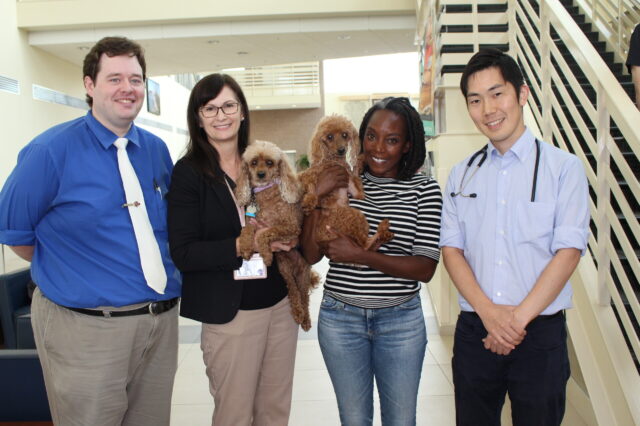- Investigator
- Parta Hatamizadeh
- Status
- Accepting Candidates
Heart Failure
UF Health heart failure doctors are known for their “First in Florida” achievements – from performing the state’s first heart transplant to delivering the world’s first-of-its-kind stem cell therapy to regenerate heart function. Our experts lead the way in heart failure care.

UF Health Shands Hospital is rated by U.S. News & World Report as one of the nation's top hospitals for treating heart failure.
Why Choose UF Health?
With decades of experience in heart failure therapies, UF Health’s board-certified, nationally recognized heart failure doctors and surgeons are on the leading edge of developing life-saving therapies and treatments enabling patients to enjoy restored quality of life and mobility. UF Health is recognized as a high-performing heart failure hospital by U.S. News & World Report, and our program is designated as a Blue Distinction Center of Excellence by Florida Blue.
We offer a patient-focused, collaborative team approach designed to help those struggling with heart failure feel better and live longer. UF Health’s heart failure team of cardiologists, cardiac surgeons and clinical coordinators work together to provide comprehensive, compassionate care and innovative, leading-edge therapies to patients suffering from advanced heart failure. Patients can expect to receive expert management of their heart failure, whether it’s through medical management, mechanical circulatory support – such as a ventricular assist device – or heart transplantation.
UF Health Heart Failure Team Collaborates to Solve Patients’ Toughest Problems
Dr. Thomas Beaver, surgical director for the UF Health heart failure program, and Dr. Ahmed Mustafa, medical director for the UF Health heart failure program, discuss what makes UF Health the best choice for heart failure care and what to expect as a patient.

Advanced Heart Failure Treatments
Heart failure occurs when the heart is unable to pump enough blood to meet the body’s needs. There may be a number of causes for this serious condition, and treatment depends on the type and stage of the disease. UF Health cardiologists and cardiac surgeons offer the full range of services for heart failure patients, including:
Medical Management
Heart failure generally responds best to treatment and control when diagnosed early. Medicines can be prescribed to control disease progression and help the heart function more effectively. These include blood thinners, drugs to lower cholesterol and control hypertension, and other medicines that reduce the pressure on the heart so that it can function under less duress. Lifestyle changes – such as eating healthy foods, exercising more, not smoking, and limiting alcohol consumption – also make a significant impact on improving and controlling early-stage heart failure.
Pacing
Some heart failure patients may benefit from cardiac resynchronization therapy, or CRT, using an implanted pacemaker to help the heart beat more effectively. In heart failure, the lower chambers of the heart, called ventricles, don’t contract enough to eject blood and sometimes they beat out of sync with each other. The pacemaker delivers a small electrical pulse that helps the heart ventricles beat more effectively and in synchrony, and can lead to improvements in the heart muscle health and reduction of other risks due to heart failure, like stroke.
Stem Cell Therapy
UF Health is on the forefront of stem cell therapy research, and offers patients who meet certain criteria the opportunity to participate a clinical trial that combines both heart and bone marrow stem cells. This is the first study of its kind in the world. The cardiac stem cells are expected to regenerate heart muscle, while the bone marrow mesenchymal stem cells have the ability to generate blood vessels and supportive tissue for heart cells. The ultimate goal is to learn if we can restore heart function to keep patients out of the hospital.
Ventricular Assist Device (VAD) and Left Ventricular Assist Device (LVAD)
VAD and LVAD devices are sometimes called a “bridge to transplant.” People awaiting heart transplant often must wait longer than their extreme illness allows before a suitable heart becomes available. During this wait, the patient’s already-weakened heart may deteriorate and become unable to pump enough blood to sustain life. A VAD can support the patient until a heart becomes available.
VAD technology has advanced over the years, and VADs are also now approved for use as destination therapy, meaning a person who is not a candidate for a transplant can use the mechanical device to maintain heart function. We currently implant several types of VADs, each with its own specific clinical indication. As this technology continues to evolve, mechanical support systems will become a standard for patients who otherwise would not be able to receive heart transplants.
We take great pride in our VADs program for heart failure patients. Our program is designated a Blue Distinction Center of Excellence by Florida Blue, and is also a Joint Commission Disease Specific certified VAD center. The outcomes for patients who receive VAD/LVAD implants at UF Health are among the best in the nation.*
*UF Health’s one-year survival rate for VAD/LVAD patients following implant is 91%, compared to 82% for the Interagency Registry for Mechanically Assisted Circulatory Supports, or INTERMACS, and post-surgical complications – such as bleeding and infection – are significantly lower than the INTERMACS averages.
Heart Surgery and Transplant
UF Health cardiac surgeons have significant experience and expertise in the surgical management of heart failure. This can include surgical restoration of the heart’s ventricular geometry to increase its pumping efficiency. We are also involved in the pioneering work of developing several devices to reduce the dilation of the failing heart. Heart transplant becomes an option when all other available medical and surgical options have failed to prevent end-stage heart failure. UF Health was the first in Florida to perform heart transplants in both adults and children, and our physicians have a long track record of “firsts” that have paved the way for improved patient outcomes. UF Health transplant surgeons and their teams have performed thousands of heart transplants, and UF Health is a major regional transplant center, meaning that the expertise and technologies in place at UF Health for heart transplant are well established and the most advanced available.
Location
-
Hospital UF Health Heart & Vascular Hospital

Hear From Our Patients

Patient Education
Want to know more? Check out our Patient Education section for more information.
Our experts
Clinical Trials: Heart Failure
UF Health research scientists make medicine better every day. They discover new ways to help people by running clinical trials. When you join a clinical trial, you can get advanced medical care. Sometimes years before it's available everywhere. You can also help make medicine better for everyone else. If you'd like to learn more about clinical trials, visit our clinical trials page. Or click one of the links below:
The Cardiorenal Syndrome during Acute decompensated heart failure (ADHF) with persistent congestion despite high dose IV diuretic therapy is associated with remarkable morbidity, which can include the need for renal dialysis or ultrafiltration, an…
- Investigator
- Alex M Parker
- Status
- Accepting Candidates
- Ages
- 22 Years - N/A
- Sexes
- All
INVESTED will test the hypothesis that high dose trivalent influenza vaccine will reduce cardiopulmonary events to a greater extent than standard dose quadrivalent influenza vaccine in high-risk cardiovascular patients with a recent history of…
- Investigator
- Carl J Pepine
- Status
- Accepting Candidates
- Ages
- 18 Years - N/A
- Sexes
- All
Community and Patient Programs: Heart Failure
Our community and patient programs provide great value to patients, families and loved ones. People can find support, educational materials, expert consultants and more. In most instances, these programs are offered free of charge.
-
UF Health Wellness University
Offers classes, programs, groups, activities, resources and health fairs throughout Gainesville, Ocala and The Villages communities.
News and Patient Stories: Heart Failure
Students Recognized for Developing 'ICUSpeak' App Alongside UF Health and Its Patients
When Freddie Taylor opened his eyes, he was where most people are after intensive surgery: in a hospital bed, being closely monitored by his health care team…

UF College of Veterinary Medicine launches open heart surgery program for dogs
September 27, 2023
The University of Florida College of Veterinary Medicine has launched an open heart surgery program for dogs, becoming the only program of its kind in the…

Latest podcast episodes
Coffee may reduce risk of heart failure
Most people fuel their day by pouring a cup of coffee. Whether you like it hot or iced, drinking more than one cup a day may reduce the risk of heart failure — but that isn’t the case for...
Better sleep can reduce risk of heart failure
Get a good night’s sleep. Your heart will be the better for it. New research shows people with the healthiest sleep patterns had a substantially lower risk of heart failure compared with those who...
Fat loss may safeguard against heart failure tied to Type 2 diabetes
Around one in 10 Americans have Type 2 diabetes, making the disease one of the most common across the country. It typically begins with insulin resistance, or a condition where the body’s cells no...

